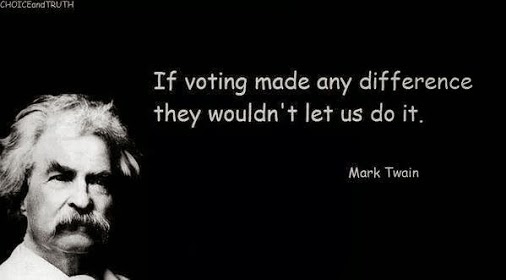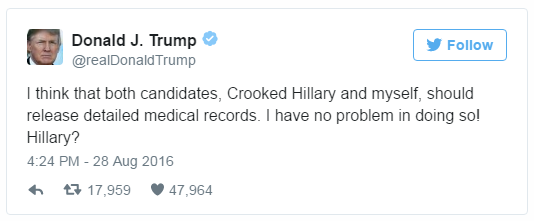"Corruptus in Extremis"
- In ways large and small the corrupt Democrats and Republicans rig elections. We saw Bernie Sanders win states but the delegates were given to Clinton. On the GOP side Trump would win but vicious anti-Trump delegates were appointed by the party to be his delegates hoping to back stab him later.
- At the Congressional level free elections have completely vanished. House and Senate seats are openly purchased by Billionaires Cartels with mountains of special interest cash.
(Ballot Access News) - On August 26, the Arizona Supreme Court unanimously upheld the 2015 law that drastically increased the number of signatures needed for Libertarians to get on the Libertarian Party primary ballot. Here is the 8-page opinion in Graham v Tamburri, cv-16-143. As a result of the 2015 law, the Arizona Libertarian primary ballot of August 30, 2016, only has one Libertarian on the ballot for any partisan office.
The opinion says the state has an interest in making it more difficult for Libertarians to get on the party’s primary ballot, because the state has an interest in keeping candidates with little voter support from getting on the November ballot. The 2015 law increased the number of signatures needed for a statewide Libertarian from 133 signatures to 3,034 signatures. Only registered Libertarians and registered independents can sign a Libertarian primary petition.
The opinion says nothing at all about another Arizona law, 16-322.C, which says that a member of a qualified party that has been on the ballot for less than four years can get on his or her own party’s primary ballot with a petition of one-tenth of 1% of the number of votes received by the winning gubernatorial candidate in 2014. For 2016, that law requires 806 signatures.
The opinion fails to discuss the point that the Arizona Libertarian Party has already established that it itself has a modicum of voter support. It has been on the ballot continuously in Arizona since 1992. Therefore, logically, a Libertarian nominee does have a modicum of voter support, because he or she is supported by a group with a modicum of voter support.
The decision says nothing about the part of the 2015 bill that also drastically increased the number of write-in votes needed in a Libertarian primary for someone to be considered nominated. The disparty between the treatment of the Libertarian Party and of the Green Party is even more shocking for the write-in primary threshold. A member of the Green Party who files to be a write-in candidate in the Green Party primary can be nominated with just one write-in vote, whereas a Libertarian for statewide office this year needs 3,034 write-ins, and only registered Libertarians can cast such a vote.
In 2002, in Browne v Bayless, the Arizona Supreme Court upheld Arizona’s June independent presidential petition deadline. But in 2008, the Ninth Circuit ruled the June deadline unconstitutional. This shows that just because the Arizona Supreme Court upholds a ballot access restriction, that doesn’t mean a federal court can’t find the law unconstitutional. The Arizona Libertarian Party has a case pending in U.S. District Court on the same issue.
In the State Supreme Court case, the party’s U.S. Senate candidate, Frank Tamburri, filed 4,205 signatures, but a Republican, Robert Graham, challenged Tamburri’s Libertarian primary petition, and the challenge was upheld. That is why the State Supreme Court case lists the Libertarian candidate as the Defendant, not the Plaintiff.
Read More . . . .
America Needs Free Elections
The United States is the ONLY nation on earth where the same two political parties
"magically" win 100% of all elections to Congress. What the people want has no meaning. Only candidates funded by millions from corrupt open borders Wall Street interests have any chance at winning.
Two Election Reforms:
- Small Districts - In Canada (see below) they have small districts of 106,000 people resulting is multi-party elections where voters have real choices on their ballots. U.S. House seats have ballooned to 700,000 each making elections so expensive only the anointed Elites win seats. Back in the 19th century because our House seats were small the U.S. had free multi party elections.
- Proportional Representation - A simple system used around the world to ensure all factions of society, not just the Elites, have a voice in government. If your party wins 20% of the vote you get 20% of the seats in the legislature. Forms of the PR system can be seen in action in Scotland, Israel and Brazil.





























































